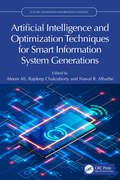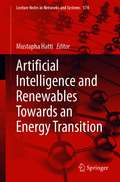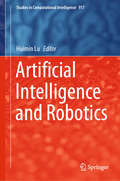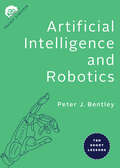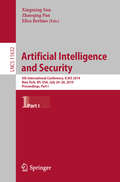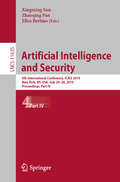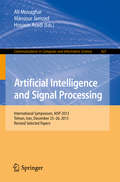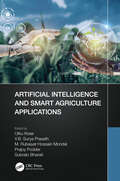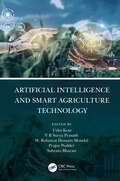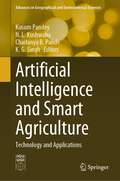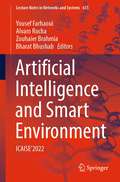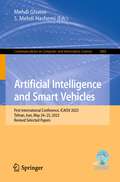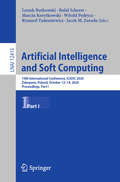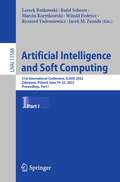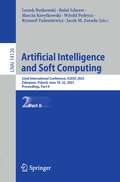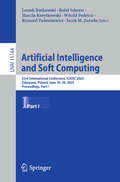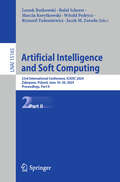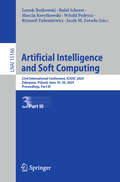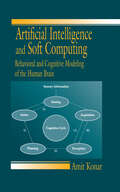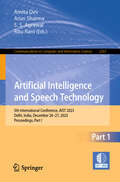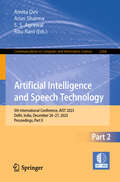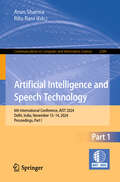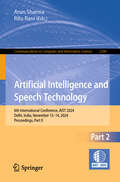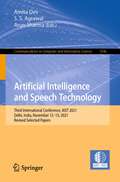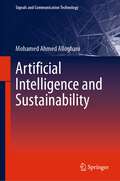- Table View
- List View
Artificial Intelligence and Optimization Techniques for Smart Information System Generations (Future Generation Information Systems)
by Rajdeep Chakraborty Aleem Ali Nawaf R. AlharbeThe text comprehensively focusses on the use of artificial intelligence and optimization techniques for creating smart information systems. Focuses on extracting information from blockchain repository using artificial intelligence and machine learning algorithms Presents deep learning models to identify and locate objects within images and videos, making it possible for machines to perform tasks such as self-driving cars, surveillance, and robotics Discusses artificial intelligence and optimization techniques for geographic information system (GIS) generation such as spatial data processing Covers artificial intelligence algorithms such as dimensionality, distance metrics, clustering, error calculation, hill climbing, and linear regression Illustrates topics such as image recognition, natural language processing, fraud detection, information system security, and intrusion detection system
Artificial Intelligence and Renewables Towards an Energy Transition (Lecture Notes in Networks and Systems #174)
by Mustapha HattiThis proceedings book emphasizes adopting artificial intelligence-based and sustainable energy efficiency integrated with clear objectives, to involve researchers, students, and specialists in their development and implementation adequately in achieving objectives. The integration of artificial intelligence into renewable energetic systems would allow the rapid development of a knowledge-based economy suitable to the energy transition, while fully integrating the renewables into the global economy. This is how artificial intelligence has hand in by conceptualizing this transition and above all by saving time. The knowledge economy is valuated within the smart cities, which are fast becoming the favorite places where the energy transition will take place efficiently and intelligently by implementing integrated approaches to energy saving and energy supply and integrated urban approaches that go beyond individual interventions in buildings or transport modes using information and communication technologies.
Artificial Intelligence and Robotics (Studies in Computational Intelligence #917)
by Huimin LuThis book provides insights into research in the field of artificial intelligence in combination with robotics technologies. The integration of artificial intelligence and robotic technologies is a highly topical area for researchers and developers from academia and industry around the globe, and it is likely that artificial intelligence will become the main approach for the next generation of robotics research. The tremendous number of artificial intelligence algorithms and big data solutions has significantly extended the range of potential applications for robotic technologies, and has also brought new challenges for the artificial intelligence community. Sharing recent advances in the field, the book features papers by young researchers presented at the 4th International Symposium on Artificial Intelligence and Robotics 2019 (ISAIR2019), held in Daegu, Korea, on August 20–24, 2019.
Artificial Intelligence and Robotics: Ten Short Lessons (Pocket Einstein Series)
by Peter J. BentleyAn expert introduction to the fascinating world of robotics, artificial intelligence, and how machines learn.In Artificial Intelligence and Robotics: Ten Short Lessons, leading expert Peter J. Bentley breaks down the fast-moving world of computers into ten pivotal lessons, presenting the reader with the essential information they need to get to understand our most powerful technology and its remarkable implications for our species.From the origins and motivation behind the birth of AI and robotics to using smart algorithms that allow us to build good robots, from the technologies that enable computers to understand a huge range of sensory information, including language and communication, to the challenges of emotional intelligence, unpredictable environments, and imagination in artificial intelligence, this is a cutting-edge, expert-led guide for curious minds. Packed full of easy-to-understand diagrams, pictures, and fact boxes, these ten lessons cover all the basics, as well as the latest understanding and developments, to enlighten the nonscientist.About the series: The Pocket Einstein series is a collection of essential pocket-sized guides for anyone looking to understand a little more about some of the most important and fascinating areas of science in the twenty-first century. Broken down into ten simple lessons and written by leading experts in their field, the books reveal the ten most important takeaways from those areas of science you've always wanted to know more about.
Artificial Intelligence and Security: 5th International Conference, ICAIS 2019, New York, NY, USA, July 26-28, 2019, Proceedings, Part I (Lecture Notes in Computer Science #11632)
by Elisa Bertino Xingming Sun Zhaoqing PanThe 4-volume set LNCS 11632 until LNCS 11635 constitutes the refereed proceedings of the 5th International Conference on Artificial Intelligence and Security, ICAIS 2019, which was held in New York, USA, in July 2019. The conference was formerly called “International Conference on Cloud Computing and Security” with the acronym ICCCS.The total of 230 full papers presented in this 4-volume proceedings was carefully reviewed and selected from 1529 submissions. The papers were organized in topical sections as follows: Part I: cloud computing; Part II: artificial intelligence; big data; and cloud computing and security; Part III: cloud computing and security; information hiding; IoT security; multimedia forensics; and encryption and cybersecurity; Part IV: encryption and cybersecurity.
Artificial Intelligence and Security: 5th International Conference, ICAIS 2019, New York, NY, USA, July 26–28, 2019, Proceedings, Part IV (Lecture Notes in Computer Science #11635)
by Elisa Bertino Xingming Sun Zhaoqing PanThe 4-volume set LNCS 11632 until LNCS 11635 constitutes the refereed proceedings of the 5th International Conference on Artificial Intelligence and Security, ICAIS 2019, which was held in New York, USA, in July 2019. The conference was formerly called “International Conference on Cloud Computing and Security” with the acronym ICCCS.The total of 230 full papers presented in this 4-volume proceedings was carefully reviewed and selected from 1529 submissions. The papers were organized in topical sections as follows: Part I: cloud computing; Part II: artificial intelligence; big data; and cloud computing and security; Part III: cloud computing and security; information hiding; IoT security; multimedia forensics; and encryption and cybersecurity; Part IV: encryption and cybersecurity.
Artificial Intelligence and Signal Processing: International Symposium, AISP 2013, Tehran, Iran, December 25-26, 2013, Revised Selected Papers (Communications in Computer and Information Science #427)
by Ali Movaghar Hossein Asadi Mansour JamzadThis book constitutes the refereed proceedings of the International Symposium, on Artificial Intelligence and Signal Processing, AISP 2013, held in Tehran, Iran, in December 2013. The 35 full papers presented were carefully reviewed and selected from 106 submissions. They are organized in topical sections such as image processing, machine vision, medical image processing, signal processing, speech processing, natural language processing, systems and AI applications, robotics.
Artificial Intelligence and Smart Agriculture Applications
by Utku KoseAn essential resource work for understanding how to design and develop smart applications for present and future problems of the field of agriculture.— Dr. Deepak Gupta, Maharaja Agrasen Institute of Technology, Delhi, India As a result of the advances in Artificial Intelligence (AI), many aspects of daily life have been transformed by smart digital technology. Advanced intelligent algorithms can provide powerful solutions to real-world problems. Smart applications have become commonplace. All areas of life are being changed by smart tools developed to deal with complex issues challenging both humanity and the earth. Artificial Intelligence and Smart Agriculture Applications presents the latest smart agriculture applications developed across the globe. It covers a broad array of solutions using data science and AI to attack problems facing agriculture worldwide. Features: Application of drones and sensors in advanced farming A cloud-computing model for implementing smart agriculture Conversational AI for farmer's advisory communications Intelligent fuzzy logic to predict global warming’s effect on agriculture Machine learning algorithms for mapping soil macronutrient elements variability A smart IoT framework for soil fertility enhancement AI applications in pest management A model using Python for predicting rainfall The book examines not only present solutions but also potential future outcomes. It looks at the role of AI-based algorithms and the almost infinite combinations of variables for agricultural applications. Researchers, public and private sector representatives, agriculture scientists, and students can use this book to develop sustainable and solutions for smart agriculture. This book’s findings are especially important as the planet is facing unprecedented environmental challenges from over-farming and climate change due to global warming.
Artificial Intelligence and Smart Agriculture Technology
by Utku KoseThis book was created with the intention of informing an international audience about the latest technological aspects for developing smart agricultural applications. As artificial intelligence (AI) takes the main role in this, the majority of the chapters are associated with the role of AI and data analytics components for better agricultural applications. The first two chapters provide alternative, wide reviews of the use of AI, robotics, and the Internet of Things as effective solutions to agricultural problems. The third chapter looks at the use of blockchain technology in smart agricultural scenarios. In the fourth chapter, a future view is provided of an Internet of Things-oriented sustainable agriculture. Next, the fifth chapter provides a governmental evaluation of advanced farming technologies, and the sixth chapter discusses the role of big data in smart agricultural applications. The role of the blockchain is evaluated in terms of an industrial view under the seventh chapter, and the eighth chapter provides a discussion of data mining and data extraction, which is essential for better further analysis by smart tools. The ninth chapter evaluates the use of machine learning in food processing and preservation, which is a critical issue for dealing with issues concerns regarding insufficient foud sources. The tenth chapter also discusses sustainability, and the eleventh chapter focuses on the problem of plant disease prediction, which is among the critical agricultural issues. Similarly, the twelfth chapter considers the use of deep learning for classifying plant diseases. Finally, the book ends with a look at cyber threats to farming automation in the thirteenth chapter and a case study of India for a better, smart, and sustainable agriculture in the fourteenth chapter. This book presents the most critical research topics of today’s smart agricultural applications and provides a valuable view for both technological knowledge and ability that will be helpful to academicians, scientists, students who are the future of science, and industrial practitioners who collaborate with academia.
Artificial Intelligence and Smart Agriculture: Technology and Applications (Advances in Geographical and Environmental Sciences)
by Chaitanya B. Pande N. L. Kushwaha Kusum Pandey K. G. SinghAs technology continues to saturate modern society, agriculture has started to adopt digital computing and data-driven innovations. This emergence of “smart” farming has led to various advancements in the field, including autonomous equipment and the collection of climate, livestock, and plant data. As connectivity and data management continue to revolutionize the farming industry, empirical research is required to understand these technological developments. This book explores the applications of various artificial intelligence techniques by identifying and describing technical, functional, and non-functional future technologies for smart farming and agriculture. The book also presents practical application opportunities for the resolution of real-world problems, including contributions from precision irrigation, greenhouse data, livestock monitoring, automation, IoT ecosystems for agriculture, cloud computing, mobile robots for precision agriculture, remote sensing applications, anddata mining. In addition, this book provides summary information about different soilless techniques such as hydroponics, aeroponics, and aquaponics, among others. This book is ideally designed for farmers, agriculturalists, product managers, farm holders, manufacturers, equipment suppliers, industrialists, governmental professionals, researchers, academicians, and students seeking current research on technological applications within agriculture and farming.
Artificial Intelligence and Smart Environment: ICAISE’2022 (Lecture Notes in Networks and Systems #635)
by Alvaro Rocha Yousef Farhaoui Zouhaier Brahmia Bharat BhushabThis book reviews the state of the art of big data analysis, artificial intelligence, and smart environments. Data is becoming an increasingly decisive resource in modern societies, economies, and governmental organizations. Data science, artificial intelligence, and smart environments inspire novel techniques and theories drawn from mathematics, statistics, information theory, computer science, and social science. This book reviews the state of the art of big data analysis, artificial intelligence, and smart environments. It includes issues that pertain to signal processing, probability models, machine learning, data mining, database, data engineering, pattern recognition, visualization, predictive analytics, data warehousing, data compression, computer programming, smart city, etc. The papers in this book were the outcome of research conducted in this field of study. The latter makes use of applications and techniques related to data analysis in general and big data and smart city in particular.The book appeals to advanced undergraduate and graduate students, post-doctoral researchers, lecturers, and industrial researchers, as well as anyone interested in big data analysis and artificial intelligence.
Artificial Intelligence and Smart Vehicles: First International Conference, ICAISV 2023, Tehran, Iran, May 24-25, 2023, Revised Selected Papers (Communications in Computer and Information Science #1883)
by Mehdi Ghatee S. Mehdi HashemiThis book constitutes the refereed proceedings of the First International Conference on Artificial Intelligence and Smart Vehicles, ICAISV 2023, held in Tehran, Iran, during May 24-25, 2023.The 14 full papers included in this book were carefully reviewed and selected from 93 submissions. They were organized in topical sections as follows: machine learning, data mining, machine vision, image processing, signal analysis, decision support systems, expert systems, and their applications in smart vehicles.
Artificial Intelligence and Soft Computing: 19th International Conference, ICAISC 2020, Zakopane, Poland, October 12-14, 2020, Proceedings, Part I (Lecture Notes in Computer Science #12415)
by Witold Pedrycz Leszek Rutkowski Marcin Korytkowski Rafał Scherer Ryszard Tadeusiewicz Jacek M. ZuradaThe two-volume set LNCS 12415 and 12416 constitutes the refereed proceedings of of the 19th International Conference on Artificial Intelligence and Soft Computing, ICAISC 2020, held in Zakopane, Poland*, in October 2020.The 112 revised full papers presented were carefully reviewed and selected from 265 submissions. The papers included in the first volume are organized in the following six parts: neural networks and their applications; fuzzy systems and their applications; evolutionary algorithms and their applications; pattern classification; bioinformatics, biometrics and medical applications; artificial intelligence in modeling and simulation.The papers included in the second volume are organized in the following four parts: computer vision, image and speech analysis; data mining; various problems of artificial intelligence; agent systems, robotics and control.*The conference was held virtually due to the COVID-19 pandemic.
Artificial Intelligence and Soft Computing: 21st International Conference, ICAISC 2022, Zakopane, Poland, June 19–23, 2022, Proceedings, Part I (Lecture Notes in Computer Science #13588)
by Witold Pedrycz Leszek Rutkowski Marcin Korytkowski Rafał Scherer Ryszard Tadeusiewicz Jacek M. ZuradaThe two-volume set LNAI 13588 and 13589 constitutes the refereed post-conference proceedings of the 21st International Conference on Artificial Intelligence and Soft Computing, ICAISC 2022, held in Zakopane, Poland, during June 19–23, 2022.The 69 revised full papers presented in these proceedings were carefully reviewed and selected from 161 submissions. The papers are organized in the following topical sections:Volume I:Neural networks and their applications; fuzzy systems and their applications; evolutionary algorithms and their applications; pattern classification; artificial intelligence in modeling and simulation.Volume II:Computer vision, image and speech analysis; data mining; various problems of artificial intelligence; bioinformatics, biometrics and medical applications.
Artificial Intelligence and Soft Computing: 22nd International Conference, ICAISC 2023, Zakopane, Poland, June 18–22, 2023, Proceedings, Part II (Lecture Notes in Computer Science #14126)
by Witold Pedrycz Leszek Rutkowski Marcin Korytkowski Rafał Scherer Ryszard Tadeusiewicz Jacek M. ZuradaThe two-volume set LNAI 14125 and 14126 constitutes the refereed conference proceedings of the 22nd International Conference on Artificial Intelligence and Soft Computing, ICAISC 2023, held in Zakopane, Poland, during June 18–22, 2023.The 84 revised full papers presented in these proceedings were carefully reviewed and selected from 175 submissions.The papers are organized in the following topical sections:Part I: Neural Networks and Their Applications; Evolutionary Algorithms and Their Applications; and Artificial Intelligence in Modeling and Simulation.Part II: Computer Vision, Image and Speech Analysis; Various Problems of Artificial Intelligence; Bioinformatics, Biometrics and Medical Applications; and Data Mining and Pateern Classification.
Artificial Intelligence and Soft Computing: 23rd International Conference, ICAISC 2024, Zakopane, Poland, June 16–20, 2024, Proceedings, Part I (Lecture Notes in Computer Science #15164)
by Witold Pedrycz Leszek Rutkowski Marcin Korytkowski Rafał Scherer Ryszard Tadeusiewicz Jacek M. ZuradaThe two-volume set ICAISC 2024 15164, 15165 and 15166 constitutes the refereed proceedings of the 23rd International Conference on Artificial Intelligence and Soft Computing, ICAISC 2024, held in Zakopane, Poland, during June 16–20, 2024. The 96 full papers included in this book were carefully reviewed and selected from 179 submissions. They are organized in topical sections as follows: Part I -neural networks and their applications; pattern classification. Part II -evolutionary algorithms and their applications; artificial intelligence in modeling and simulation; computer vision, image and speech analysis. Part III - various problems of artificial intelligence; bioinformatics, biometrics and medical applications.
Artificial Intelligence and Soft Computing: 23rd International Conference, ICAISC 2024, Zakopane, Poland, June 16–20, 2024, Proceedings, Part II (Lecture Notes in Computer Science #15165)
by Witold Pedrycz Leszek Rutkowski Marcin Korytkowski Rafał Scherer Ryszard Tadeusiewicz Jacek M. ZuradaThe two-volume set ICAISC 2024 15164, 15165 and 15166 constitutes the refereed proceedings of the 23rd International Conference on Artificial Intelligence and Soft Computing, ICAISC 2024, held in Zakopane, Poland, during June 16–20, 2024. The 96 full papers included in this book were carefully reviewed and selected from 179 submissions. They are organized in topical sections as follows: Part I - neural networks and their applications; pattern classification. Part II - evolutionary algorithms and their applications; artificial intelligence in modeling and simulation; computer vision, image and speech analysis. Part III - various problems of artificial intelligence; bioinformatics, biometrics and medical applications.
Artificial Intelligence and Soft Computing: 23rd International Conference, ICAISC 2024, Zakopane, Poland, June 16–20, 2024, Proceedings, Part III (Lecture Notes in Computer Science #15166)
by Witold Pedrycz Leszek Rutkowski Marcin Korytkowski Rafał Scherer Ryszard Tadeusiewicz Jacek M. ZuradaThe two-volume set ICAISC 2024 15164, 15165 and 15166 constitutes the refereed proceedings of the 23rd International Conference on Artificial Intelligence and Soft Computing, ICAISC 2024, held in Zakopane, Poland, during June 16–20, 2024. The 96 full papers included in this book were carefully reviewed and selected from 179 submissions. They are organized in topical sections as follows: Part I -neural networks and their applications;pattern classification. Part II -evolutionary algorithms and their applications;artificial intelligence in modeling and simulation;computer vision, image and speech analysis. Part III - various problems of artificial intelligence;bioinformatics, biometrics and medical applications.
Artificial Intelligence and Soft Computing: Behavioral and Cognitive Modeling of the Human Brain
by Amit KonarWith all the material available in the field of artificial intelligence (AI) and soft computing-texts, monographs, and journal articles-there remains a serious gap in the literature. Until now, there has been no comprehensive resource accessible to a broad audience yet containing a depth and breadth of information that enables the reader to fully understand and readily apply AI and soft computing concepts.Artificial Intelligence and Soft Computing fills this gap. It presents both the traditional and the modern aspects of AI and soft computing in a clear, insightful, and highly comprehensive style. It provides an in-depth analysis of mathematical models and algorithms and demonstrates their applications in real world problems. Beginning with the behavioral perspective of "human cognition," the text covers the tools and techniques required for its intelligent realization on machines. The author addresses the classical aspects-search, symbolic logic, planning, and machine learning-in detail and includes the latest research in these areas. He introduces the modern aspects of soft computing from first principles and discusses them in a manner that enables a beginner to grasp the subject. He also covers a number of other leading aspects of AI research, including nonmonotonic and spatio-temporal reasoning, knowledge acquisition, and much more. Artificial Intelligence and Soft Computing: Behavioral and Cognitive Modeling of the Human Brain is unique for its diverse content, clear presentation, and overall completeness. It provides a practical, detailed introduction that will prove valuable to computer science practitioners and students as well as to researchers migrating to the subject from other disciplines.
Artificial Intelligence and Speech Technology: 5th International Conference, AIST 2023, Delhi, India, December 26–27, 2023, Proceedings, Part I (Communications in Computer and Information Science #2267)
by Arun Sharma S. S. Agrawal Amita Dev Ritu RaniThis two-volume set, CCIS 2267 and 2268, constitutes the refereed proceedings of 5th International Conference on Artificial Intelligence and Speech Technology, AIST 2023, held in Delhi, India, during December 26–27, 2023. The 71 papers presented in two volumes were carefully reviewed and selected from 235 submissions. Part I focuses on Speech Technology using AI and Part II focuses on AI innovations for CV and NLP. These volumes are organized in the following topical sections: Part I: Trends and Applications in Speech Processing; Recent Trends in Speech and NLP; Emerging trends in Speech Processing; Advances in Computational Linguistics and NLP. Part II: Recent Trends in Machine Learning and Deep Learning; Analysis using Hybrid technologies with Artificial Intelligence; Exploring New Horizons in Computer Vision Research; Applications of Machine Learning and Deep Learning.
Artificial Intelligence and Speech Technology: 5th International Conference, AIST 2023, Delhi, India, December 26–27, 2023, Proceedings, Part II (Communications in Computer and Information Science #2268)
by Arun Sharma S. S. Agrawal Amita Dev Ritu RaniThis two-volume set, CCIS 2267 and 2268, constitutes the refereed proceedings of 5th International Conference on Artificial Intelligence and Speech Technology, AIST 2023, held in Delhi, India, during December 26–27, 2023. The 71 papers presented in two volumes were carefully reviewed and selected from 235 submissions. Part I focuses on Speech Technology using AI and Part II focuses on AI innovations for CV and NLP. These volumes are organized in the following topical sections: Part I: Trends and Applications in Speech Processing; Recent Trends in Speech and NLP; Emerging trends in Speech Processing; Advances in Computational Linguistics and NLP. Part II: Recent Trends in Machine Learning and Deep Learning; Analysis using Hybrid technologies with Artificial Intelligence; Exploring New Horizons in Computer Vision Research; Applications of Machine Learning and Deep Learning.
Artificial Intelligence and Speech Technology: 6th International Conference, AIST 2024, Delhi, India, November 13–14, 2024, Proceedings, Part I (Communications in Computer and Information Science #2389)
by Arun Sharma Ritu RaniThis two-volume set, CCIS 2389 and CCIS 2390, constitutes selected papers presented at the 6th International Conference on Artificial Intelligence and Speech Technology, AIST 2024, held in Delhi, India, during November 13–14, 2024. The 40 full papers and 15 short papers presented in these proceedings were carefully reviewed and selected from 398 submissions.These papers focus on Speech Technology using AI and AI innovations for CV and NLP. They have been categorized under the following topical sections:- Part I : Trends and Applications in Speech Processing; Recent Trends in Speech and NLP; Emerging trends in Speech Processing; Advances in Computational Linguistics and NLP. Part II : Recent Trends in Machine Learning and Deep Learning; Analysis using Hybrid technologies with Artificial Intelligence; Exploring New Horizons in Computer Vision Research.
Artificial Intelligence and Speech Technology: 6th International Conference, AIST 2024, Delhi, India, November 13–14, 2024, Proceedings, Part II (Communications in Computer and Information Science #2390)
by Arun Sharma Ritu RaniThis two-volume set, CCIS 2389 and CCIS 2390, constitutes selected papers presented at the 6th International Conference on Artificial Intelligence and Speech Technology, AIST 2024, held in Delhi, India, during November 13–14, 2024. The 40 full papers and 15 short papers presented in these proceedings were carefully reviewed and selected from 398 submissions.These papers focus on Speech Technology using AI and AI innovations for CV and NLP. They have been categorized under the following topical sections:- Part I : Trends and Applications in Speech Processing; Recent Trends in Speech and NLP; Emerging trends in Speech Processing; Advances in Computational Linguistics and NLP. Part II : Recent Trends in Machine Learning and Deep Learning; Analysis using Hybrid technologies with Artificial Intelligence; Exploring New Horizons in Computer Vision Research.
Artificial Intelligence and Speech Technology: Third International Conference, AIST 2021, Delhi, India, November 12–13, 2021, Revised Selected Papers (Communications in Computer and Information Science #1546)
by Arun Sharma S. S. Agrawal Amita DevThis volume constitutes selected papers presented at the Third International Conference on Artificial Intelligence and Speech Technology, AIST 2021, held in Delhi, India, in November 2021. The 36 full papers and 18 short papers presented were thoroughly reviewed and selected from the 178 submissions. They provide a discussion on application of Artificial Intelligence tools in speech analysis, representation and models, spoken language recognition and understanding, affective speech recognition, interpretation and synthesis, speech interface design and human factors engineering, speech emotion recognition technologies, audio-visual speech processing and several others.
Artificial Intelligence and Sustainability (Signals and Communication Technology)
by Mohamed Ahmed AlloghaniThis book gives readers the tools to craft AI systems that don't just thrive today, but endure sustainably into the future. Whether a trailblazer or an aspiring innovator, this book enables readers to resonate with the ambitions of software developers, data scientists, and AI practitioners. The author covers the latest techniques and best practices for energy efficiency, reducing carbon footprints, and ensuring fair and ethical AI. The book also addresses important issues such as AI governance, managing risks, and ensuring transparency. Topics covered include understanding the relationship between AI and sustainable development, strategies for building efficient AI systems, and ethical considerations in AI development, among others. The author includes case studies of companies and organizations that have successfully implemented sustainable AI software development practices. Therefore, this book will be of interest to AI practitioners, academics, researchers, and lecturers in computer science, artificial intelligence, machine learning and data sciences.
